It’s the middle of the night, and you suddenly wake up in a state of terror. Your heart is racing, you’re sweating profusely, and you can’t seem to shake the feeling of fear that has overcome you. You try to scream, but no sound comes out. This is what it’s like to experience a night terror. Night terrors are a type of sleep disorder that can cause a person to wake up screaming or in a state of extreme fear. They’re often confusing and distressing for both the person experiencing them and those around them. In this article, we’ll explore the causes, symptoms, and treatments of night terrors, as well as ways to prevent them from happening.
What are Night Terrors?
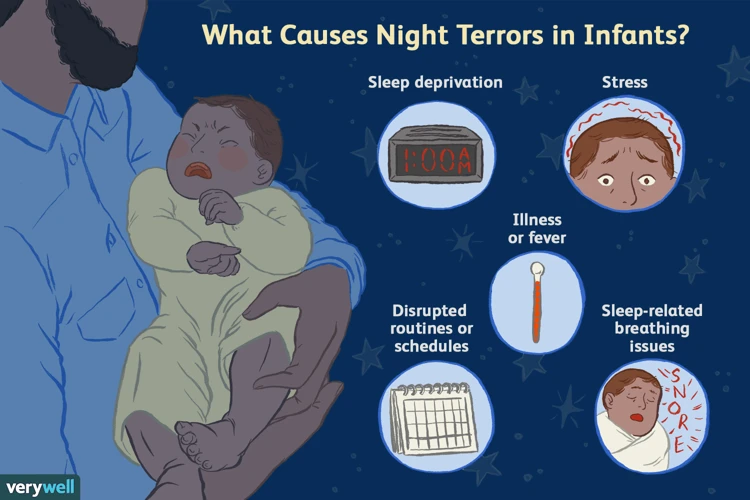
As the night falls and darkness envelops us, we often slip into a peaceful slumber, allowing our minds and bodies to rest and rejuvenate. However, for some individuals, sleep can be anything but restful. They may experience intense episodes of terror and fear that leave them screaming, sweating, and trembling. These episodes are known as night terrors, and they can affect both children and adults. In this section, we will explore the definition of night terrors and the crucial differences between night terrors and nightmares.
Definition of Night Terrors
Night Terrors, also known as sleep terrors, are a type of parasomnia that is categorized by sudden awakening from sleep accompanied by intense fear and emotional distress. Night terrors are more distressing than nightmares and they mainly affect children aged between 3-12 years, though adults can be affected as well.
The DSM-5, which is a diagnostic manual used by mental health professionals, defines night terrors as recurrent episodes of abrupt awakening from sleep accompanied by intense fear and a variety of psychophysiological symptoms such as rapid heart rate, increased breathing, sweating and dilated pupils.
Night terrors are not just a figment of imagination – they are a real sleep disorder and can be very distressing for the person experiencing them as well as their loved ones. Unlike nightmares, night terrors are not easily recalled, and the person may have no memory of them. They can last for a few minutes to half an hour after which the affected individual usually goes back to sleep.
Here’s a table summarizing the definition of night terrors:
| Term | Definition |
|---|---|
| Night Terrors | A type of parasomnia characterized by intense fear and emotional distress during sleep |
| DSM-5 | A diagnostic manual used by mental health professionals that defines night terrors as recurrent episodes of sudden awakening accompanied by physical and emotional symptoms |
| Difference from Nightmares | Night terrors are more distressing and involve a greater physical response than nightmares. Unlike nightmares, the affected individual may have no memory of the event |
It is important to note that the exact cause of night terrors is not always known, but there are a variety of factors that may contribute to their occurrence, as discussed in the following sections.
Difference between Nightmares and Night Terrors
It is common for people to confuse nightmares with night terrors, but these are actually two very different things. Here are some key differences:
- Cause: Nightmares are usually caused by stress, anxiety, and specific traumatic events. Night terrors, on the other hand, are often caused by an over-aroused central nervous system during sleep.
- Time of Occurrence: Nightmares occur during REM (Rapid Eye Movement) sleep, which is normally towards the end of the sleep cycle. Night terrors, on the other hand, occur during non-REM (NREM) sleep, which is earlier in the night.
- Memory of the Event: People usually remember their nightmares, and they may even be able to describe them in detail. However, people who experience night terrors usually have no memory of the event, or only a vague recollection.
- Symptoms: Nightmares may cause a person to wake up suddenly with feelings of fear, anxiety, or dread. In contrast, night terrors usually involve intense fear, screaming, shouting, and thrashing around in bed. The person may also sweat, breathe rapidly, and have a racing heart.
It is important to note that both nightmares and night terrors can be distressing experiences, and can have a negative impact on a person’s quality of life. However, understanding the differences between the two is important for determining the underlying cause and finding the most appropriate treatment.
Causes of Night Terrors
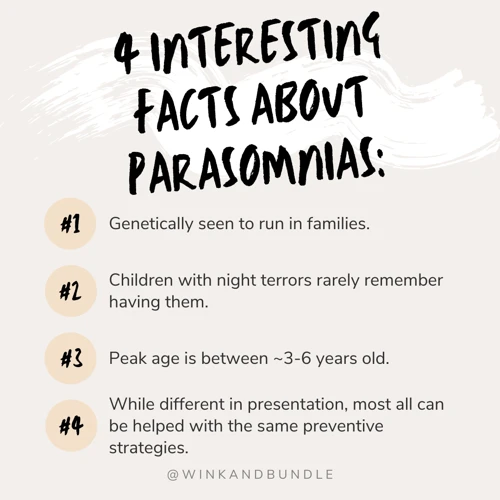
Night terrors can be a frightening experience for both the individual experiencing them and those around them. The mystery surrounding the root cause of night terrors can add to the perplexity of the situation. Understanding the possible causes of night terrors can provide insight into how to prevent and manage them. Below we explore several factors that research suggests may contribute to the occurrence of night terrors.
Age and Development
Age and Development:
Night terrors are most commonly observed in children between the ages of 3 and 12, with the incidence rates peaking between the ages of 4 and 6. However, the condition can also affect teenagers and adults, although less frequently.
There is a consensus among medical experts that night terrors result from immature brain development, which occurs most rapidly during early childhood. According to some studies, children who experience night terrors typically have a family history of the condition or have a family member who suffers from sleepwalking or night terrors.
As children grow, the brain matures and the incidence of night terrors decreases. In most cases, the condition typically disappears by the time a child reaches adolescence. However, in some instances, the condition may persist beyond childhood and into adulthood.
The exact reasons why some individuals continue to experience night terrors while others recover are still unknown. However, it is believed that genetic and environmental factors may play a role. Additionally, individuals who develop other sleep disorders or mental health conditions may also be more likely to experience night terrors.
Stress and Anxiety
Stress and anxiety are common causes of night terrors, particularly in adults. The stress hormone cortisol can interfere with a person’s sleep cycle and disrupt the natural progression of sleep phases. If a person is not able to reach the deepest stage of sleep, the stage that is most important for rest and recovery, then they may be more susceptible to experiencing night terrors and other sleep disturbances.
Anxiety can also contribute to night terrors. People who suffer from anxiety disorders may have more frequent night terrors, as well as other sleep disorders. The negative thoughts and worries associated with anxiety can spill over into a person’s sleep, causing them to experience disturbing dreams and night terrors.
Moreover, traumatic events can trigger anxiety and lead to night terrors. If a person experiences a traumatic experience, such as military combat, physical or sexual assault, or a natural disaster, they may develop symptoms of post-traumatic stress disorder (PTSD), which can include frequent night terrors.
It’s essential to address the underlying causes of stress and anxiety to prevent night terrors from occurring. Stress-reducing techniques, such as meditation, deep breathing, or exercise, can help to relax the mind and body before bedtime. Additionally, seeking professional therapy can help a person work through traumatic experiences or manage anxiety disorders, which can alleviate night terrors.
Other Underlying Medical Conditions
Night terrors can also be caused by other underlying medical conditions, such as:
- Sleep Apnea: A condition where a person’s breathing repeatedly stops and starts during sleep. This can cause disruptions in sleep and lead to night terrors.
- Fever: Sometimes fever can lead to night terrors, particularly in children. This is because fevers can cause disruptions in normal sleep patterns.
- Restless Leg Syndrome: A condition characterized by an uncontrollable urge to move one’s legs. This can disrupt sleep and lead to night terrors.
- Post Traumatic Stress Disorder (PTSD): Individuals with PTSD may experience nightmares or night terrors related to their traumatic experiences. These can be particularly vivid and upsetting.
- Some Medications: Certain medications can cause night terrors as a side effect. For example, some antidepressants or anti-anxiety medications may disrupt sleep and lead to night terrors.
- Other Sleep Disorders: Individuals with other sleep disorders, such as narcolepsy or insomnia, may be more susceptible to experiencing night terrors.
It’s important to note that if you suspect a medical condition may be causing your night terrors, it’s important to consult with a healthcare professional to determine the appropriate treatment. Addressing the underlying condition may help alleviate the night terrors.
Symptoms of Night Terrors
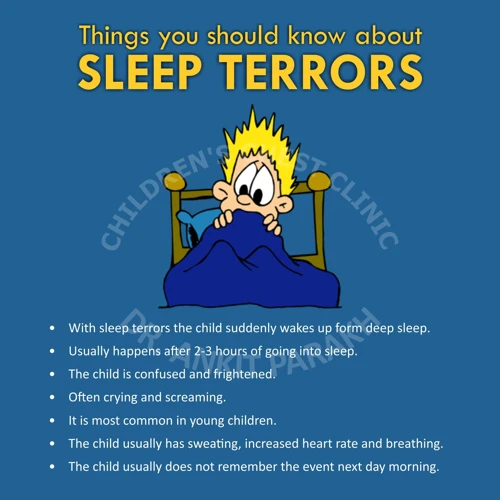
For parents or individuals who have experienced night terrors, the symptoms can be both alarming and confusing. Unlike nightmares, which tend to happen during the latter part of the evening, night terrors take place within a few hours after the onset of deep sleep. They often manifest in screaming, crying, and thrashing around, which can be terrifying and perplexing for anyone witnessing the episode. In this section, we will discuss the physical and emotional manifestations of night terrors, along with how individuals can recognize and differentiate them from nightmares.
Physical Manifestations
Night terrors can be a frightening experience not only for the person going through it but also for those who witness it. Physical manifestations of night terrors can vary from person to person. In this section, we will discuss some of the possible physical manifestations that someone experiencing night terrors may go through.
One physical sign of night terrors is sweating or a sensation of being overheated. The person may feel clammy or have a rapid heartbeat, as if they have just completed a workout. They may thrash about or move erratically; in some cases, they may even get up and walk around while still asleep.
Another common physical manifestation of night terrors is that the person may scream, cry or yell incoherently. They may also experience intense confusion, disorientation or even hallucinations. It is important to note that during a night terror episode, the person is not fully awake and thus may not be aware of their actions or surroundings.
Additionally, the person undergoing the night terror may seem to be in an unresponsive or trance-like state. They may not be able to be woken up or respond to their name being called. Some may even have their eyes open, although they are not fully conscious and may not even register those around them.
It is crucial to keep in mind that whilst night terrors are an upsetting occurrence, it is important to provide the individual experiencing them with support and reassurance. Handling a person with care during an episode is essential, and in most cases, it is during this time that their loved ones can be the most beneficial. In this way, the patient can feel safe and gradually come out of these episodes.
Emotional Signs and Symptoms
The emotional signs and symptoms of night terrors can vary depending on the individual experiencing them. It is important to recognize and address these symptoms in order to receive proper treatment. Some emotional signs and symptoms of night terrors are:
| Emotional Signs and Symptoms | Description |
|---|---|
| Fear and Anxiety | Night terrors can cause intense feelings of fear and anxiety. The individual may wake up from the terror feeling panicked and disoriented. |
| Trembling or shaking | During a night terror, the individual may tremble or shake uncontrollably. This is due to the intense emotional and physical response to the terror. |
| Crying or screaming | Individuals experiencing night terrors may cry or scream during the episode. This can be distressing for both the individual and anyone who may be sharing the sleeping space. |
| Confusion and disorientation | After a night terror, the individual may be confused and disorientated. They may not remember the terror or understand what happened, adding to their emotional distress. |
| Depression and mood changes | Individuals who experience frequent night terrors may also suffer from depression and mood changes. The fear and anxiety caused by the terrors can make it difficult for the individual to cope with daily life, leading to feelings of hopelessness and despair. |
It is important to note that not everyone who experiences night terrors will exhibit all of the emotional signs and symptoms listed above. However, if an individual is experiencing any of these symptoms, it is important to seek medical attention to address the underlying cause of the night terrors.
Treatment of Night Terrors
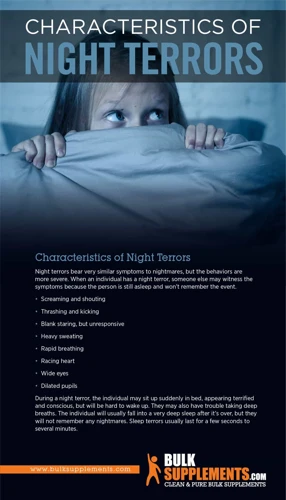
When it comes to finding the right treatment for night terrors, there are various options available. These treatments aim to help manage and alleviate the symptoms and reduce their frequency. It’s important to note that treatments may work differently for each individual and consulting with a medical professional is necessary to determine the best course of action. In this section, we’ll discuss the different medical interventions, home remedies and self-care, as well as therapy and counseling that can be used to address night terrors.
Medical Interventions
There are several medical interventions that can be utilized to treat night terrors. These include:
- Medication: If a medical condition is found to be the root cause of night terrors, medications may be prescribed to manage the condition. In some cases, medication may also be prescribed to help reduce the frequency and severity of night terrors. However, medications should only be used under the guidance of a healthcare provider, as some can lead to dependence or other adverse effects.
- CPAP: For those who have night terrors due to sleep apnea, a continuous positive airway pressure (CPAP) machine may be recommended. This is a machine that delivers a constant stream of air to keep the airway open during sleep, reducing the occurrence of night terrors.
- Sleep deprivation: Though it may seem counterintuitive, sometimes intentionally depriving oneself of sleep can help reduce the number of night terrors experienced. This is because night terrors often occur during deep sleep, so decreasing the amount of deep sleep during a given night can lead to fewer incidents.
- Sedatives: In some cases, sedative medications may be prescribed to help reduce the frequency of night terrors. However, as with any medication, it is important to use these under the guidance of a healthcare provider and only as a last resort.
- Hypnosis: Hypnosis has been used as a treatment for night terrors in some cases, particularly if the person’s night terrors are related to anxiety or stress. Under hypnosis, the person can learn relaxation techniques that can help reduce the frequency and intensity of night terrors.
It is important to note that medical interventions should always be used under the guidance of a healthcare professional. Additionally, they should only be used as a last resort after all other treatments and lifestyle changes have been attempted.
Home Remedies and Self-Care
When it comes to managing night terrors, home remedies and self-care can help alleviate the symptoms and reduce their frequency. Here are some effective strategies to consider:
| Strategy | Description |
|---|---|
| Establish a bedtime routine | Try to create a consistent sleep schedule and bedtime routine to help your body know when it’s time to wind down and go to sleep. This can involve activities such as taking a warm bath, reading a book, or practicing relaxation exercises. |
| Minimize stress and anxiety | Because stress and anxiety can worsen night terrors, it’s important to focus on activities that can help reduce feelings of stress and anxiety. Some examples include practicing mindfulness, yoga, or meditation. |
| Avoid triggers | Identify any triggers that seem to make your night terrors worse and try to avoid them. For instance, if watching a scary movie before bedtime tends to cause night terrors, try to avoid doing so in the future. |
| Create a comforting sleeping environment | Make sure that your sleeping environment is comfortable and conducive to restful sleep. Consider investing in comfortable bedding, minimizing noises and light, and keeping the bedroom at a comfortable temperature. |
| Talk to someone about your experiences | It can be helpful to process your experiences with someone who can provide a listening ear and emotional support. Consider talking with a close friend or family member, or reach out to a mental healthcare professional for additional support. |
Although these self-care strategies can be useful for reducing night terrors, it’s important to keep in mind that they may not be sufficient on their own for more severe cases. If you are experiencing frequent or severe night terrors, it’s important to seek professional help to explore additional treatment options.
Therapy and Counseling
Individuals experiencing night terrors may benefit from therapy and counseling as treatments. There are different types of therapy that can help reduce or even eliminate the occurrence of night terrors.
| Type of Therapy | Description |
|---|---|
| Cognitive Behavioral Therapy (CBT) | This type of therapy focuses on changing negative thought patterns and behaviors. A therapist works with the patient to identify triggers that may be causing the night terrors and develop coping strategies to manage them. CBT can also help individuals learn relaxation techniques and reduce anxiety. |
| Imagery Rehearsal Therapy (IRT) | IRT involves visualizing and rehearsing a new, positive ending to a nightmare or night terror. The patient works with a therapist to imagine a different outcome for the dream and practice it until it becomes a habit. This type of therapy has been found to be particularly effective in reducing the frequency and intensity of nightmares. |
| Eye Movement Desensitization and Reprocessing (EMDR) | This therapy involves recalling traumatic experiences while following a therapist’s hand movements or other forms of rhythmic stimuli. The goal of EMDR is to help patients process their trauma and reduce the associated distress. It can also be used to address other underlying mental health conditions that may be contributing to night terrors. |
Therapy and counseling can be effective treatments for reducing the frequency and intensity of night terrors. Patients will work with a therapist to develop an individualized treatment plan that takes into account their specific symptoms and triggers. In addition to these therapies, a therapist or counselor may also recommend lifestyle changes, relaxation techniques, and other coping strategies to manage night terrors.
Prevention of Night Terrors
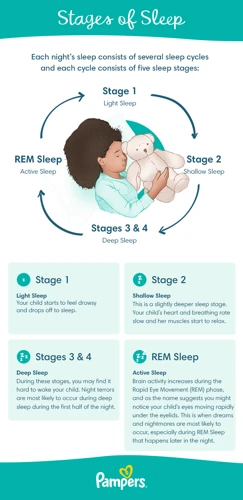
As night terrors can be a distressing occurrence for both children and adults, taking steps to prevent their onset is highly recommended. While there may not be a surefire way to completely eliminate night terrors, certain lifestyle changes and habits can significantly reduce the frequency and severity of episodes. Practicing anxiety-reducing techniques and healthy sleep habits can contribute to a more restful and peaceful night’s sleep. In this section, we’ll explore some effective strategies for preventing night terrors.
Healthy Sleeping Habits
Maintaining healthy sleeping habits is crucial in both preventing and treating night terrors. Here are some tips for improving your sleep hygiene:
| Tips for healthy sleeping habits: |
| Stick to a regular sleep schedule, even on weekends. |
| Avoid caffeine, nicotine, and alcohol before bedtime. |
| Set up a relaxing bedtime routine to help you unwind and prepare for sleep. |
| Make sure your sleep environment is cool, dark, and quiet. |
| Avoid using electronic devices, such as laptops and smartphones, in bed. |
| Exercise regularly, but not too close to bedtime. |
| Avoid large meals and drinking too much water before bedtime. |
By incorporating these simple habits into your daily routine, you can improve the quality of your sleep and decrease the likelihood of night terrors. However, it is important to note that healthy sleeping habits alone may not be enough to treat night terrors if they are caused by underlying psychological or physical issues. It is important to seek professional help if you are experiencing frequent night terrors or if they are affecting your daily life.
Anxiety-Reducing Strategies
Anxiety-reducing strategies can be helpful to prevent night terrors from occurring. Here are some methods to consider:
| Strategy | Description |
|---|---|
| Mindfulness | Mindfulness exercises, such as deep breathing, meditation, and visualization, can help calm the mind and reduce anxiety levels. These exercises can be practiced before bed or at any time during the day when anxiety arises. |
| Regular Exercise | Engaging in regular physical activity can help alleviate anxiety and improve sleep quality. Exercise is a natural stress reliever and can help release pent-up tension in the body. |
| Aromatherapy | Some essential oils, such as lavender and chamomile, are known for their relaxing properties. Adding a few drops of these oils to a diffuser or pillow can help promote relaxation and reduce anxiety levels. |
| Progressive Muscle Relaxation | This technique involves tensing and then relaxing different muscle groups in the body. It can help promote relaxation and reduce muscle tension, which can contribute to anxiety and stress levels. |
| Cognitive Behavioral Therapy (CBT) | CBT can be helpful for addressing anxiety and other underlying mental health conditions that may be contributing to night terrors. It involves identifying negative thoughts and behaviors and replacing them with positive ones. |
It’s important to remember that what works for one person may not work for another. It may take some trial and error to find the right combination of anxiety-reducing strategies that works best for you.
Lifestyle Changes
Making certain lifestyle changes can also help in the prevention of night terrors. Here are some of the changes that might be beneficial:
| Lifestyle Changes | Explanation |
|---|---|
| Limiting Screen Time | Excessive screen time can overstimulate the brain making it difficult to fall asleep. Reducing screen time before bed can help promote a restful night’s sleep and prevent night terrors. |
| Creating a Soothing Bedtime Routine | A soothing bedtime routine like taking a warm bath, doing relaxation exercises, or reading a book can help one unwind and relax before bedtime. This can help reduce the occurrence of night terrors. |
| Regular Exercise | Studies have shown that regular exercise can help reduce anxiety and promote better sleep quality. Incorporating exercise into one’s daily routine can help prevent night terrors. |
| Healthy Diet | Eating a well-balanced diet with adequate nutrients can help promote overall health, reduce stress and anxiety, and prevent night terrors. Additionally, avoiding large meals right before bedtime can help prevent night terrors. |
| Avoiding Stimulants | Stimulants like caffeine, nicotine, and alcohol can disrupt the sleep cycle and increase the likelihood of night terrors. Avoiding or limiting the intake of these substances can help prevent night terrors. |
By incorporating these lifestyle changes into daily routine, one can prevent the occurrence of night terrors and promote a restful night’s sleep.
When to Seek Professional Help
While night terrors may be relatively common among children, they can definitely be a cause of concern for parents and caregivers. Fortunately, most children outgrow night terrors and there are various effective treatments available. However, in some cases, seeking professional help may be necessary.
So, when should you seek professional help for night terrors?
If your child’s night terrors are frequent, intense, and adversely affecting their daily life and activities, it may be time to consult a doctor. Additionally, if your child has other underlying medical conditions or you suspect that medications may be causing the night terrors, seeking medical attention is important.
Other signs that may indicate the need for professional intervention include:
– The night terrors persist beyond the age of 12 years
– The child is at risk of harming themselves or others during an episode
– The child regularly experiences daytime anxiety or behavioral issues
– The night terrors occur alongside other medical conditions like sleep apnea or seizures
It is essential to remember that night terrors can take a toll not only on the child but also on their caregivers. Seeking professional help can not only help alleviate the child’s symptoms but also provide support and resources for both the child and the family.
Available medical interventions for night terrors include:
– Medications to treat underlying medical conditions causing the night terrors
– Prescription medication to regulate sleep patterns or reduce anxiety
– Referral to a sleep specialist or other healthcare professionals for expert intervention
Additionally, seeking counseling or therapy can be beneficial in managing night terrors by addressing causes of anxiety and stress in a child’s life.
The good news is that night terrors can be effectively treated, and seeking professional help is a proactive step towards improving the child’s quality of life.
Conclusion
In conclusion, living with night terrors can be challenging and disruptive to one’s life. It is essential to understand that while night terrors are a relatively common occurrence among children, they can also affect adults. The causes of night terrors may vary, including development, stress and anxiety, and underlying medical conditions.
Symptoms of night terrors can range from physical manifestations, such as sweating and rapid heart rate, to emotional signs, such as fear and confusion. It is crucial to seek medical attention if night terrors are interfering with daily activities, causing disruptions in sleep patterns, and affecting overall well-being.
There are a variety of treatment options for this condition, including medication, therapy, and self-care methods. Simple lifestyle changes, such as practicing good sleep hygiene and reducing anxiety levels, may increase the chances of prevention.
It is essential to seek professional help if the episodes of night terrors persist or intensify, and impacts mental and physical health.
Overall, understanding the causes, symptoms, and available treatments for night terrors is an important step in finding relief and reducing the impact it has on your daily life. By taking action and seeking help, people can manage and overcome this condition, ultimately improving their overall well-being and quality of life.
Frequently Asked Questions
What triggers night terrors?
Night terrors may be triggered by stress, sleep deprivation, medications, or underlying medical conditions such as sleep apnea or restless leg syndrome.
Can adults have night terrors?
Yes, although night terrors are most common in children aged 3-12, adults can also experience them.
How are night terrors diagnosed?
Doctors typically diagnose night terrors based on the individual’s medical history, symptoms, and a physical exam.
Do night terrors require treatment?
Not always. Sometimes simply making changes to your sleep routine or managing stress and anxiety can help alleviate symptoms. However, if night terrors are disruptive and affect daily functioning, treatment may be necessary.
Can medication help with night terrors?
Yes, there are medications that can be prescribed to help manage night terrors. However, they are not always necessary and should be discussed with a doctor.
How can parents help their child during a night terror?
During a night terror, it’s important for parents to remain calm and not wake the child. Instead, they can stay close to the child and softly speak reassuring words until the episode passes.
Can night terrors be prevented?
While there is no surefire way to prevent night terrors, practicing good sleep hygiene, reducing stress and anxiety, and addressing any underlying medical conditions can help lessen the frequency and intensity of episodes.
Do night terrors increase the risk of other sleep disorders?
There is some evidence to suggest that children who experience night terrors may be at higher risk for developing other sleep disorders, such as sleepwalking, in the future.
What is the difference between a sleep terror and a panic attack?
A sleep terror occurs during sleep and typically involves screaming, thrashing, and other physical manifestations. A panic attack, on the other hand, occurs while the individual is awake and conscious and involves feelings of intense fear, hyperventilation, and other physiological symptoms.
Is it normal to remember a night terror?
It’s not uncommon for individuals to remember the feelings of fear and panic associated with a night terror, although they may not remember the specifics of the episode itself.








